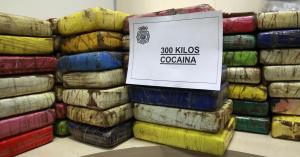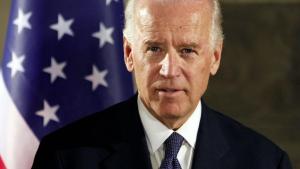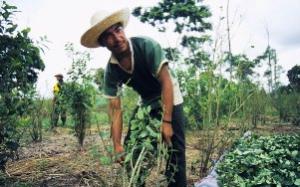The Global Commission on Drug Policy has released a new report on how to most effectively target organized crime, and that includes moving toward legal, regulated drug markets.
Just a couple of miscreant men in blue this week, and they were both apparently slinging weed.
The former Honduran National Police chief just got indicted on drug charges in New York City, Dr. Bronner's Magic Soaps just bestowed a huge gift on the Oregon psilocybin initiative campaign, and more.
No electronic signature-gathering for the Montana marijuana legalization initiatives, a Canadian psychedelic decriminalization petition has enough signatures to send it to the House of Commons, Mexico's Jalisco New Generation Cartel is handing out crisis supplies in Puerta Vallarta, and more.
President Trump has authorized the Defense Department to call up military reserves as he ramps up a campaign against the cartels, a Nebraska medical marijuana initiative plans to continue signature-gathering, the legal pot industry is still hiring, and more.
A psilocybin mushroom decriminalization bill has been filed, Joe Biden again calls for marijuana decriminalization, and more.
A Republican pollster in Pennsylvania calls on GOP legislators to consider supporting marijuana legalization, new New York City drug testing rules go into effect next week, a Minnesota legalization bill is introduced, and more.
The coronavirus pandemic is wreaking havoc with global drug markets, the Sinaloa Cartel has imposed a coronavirus curfew on a city of nearly a million people, San Francisco is taking a harm reduction approach to quarantined drug users, and more.
A new study reports that driving while black is still a thing even in legal marijuana states, Joe Biden touts some coercive, but non-carceral approaches to drug offenders, and more.
Advocacy groups are pushing for marijuana businesses to be included in the next coronavirus relief bill, a pair of Oregon drug reform initiatives are teaming up for signature-gathering, and more.
For nearly a decade now, a collection of former heads of state, high political figures, businessmen, and cultural figures have been working to reform drug policy at the national and international levels. Known as the Global Commission on Drug Policy, this group of planetary elders has been busy issuing reports at the rate of one a year on how to reduce the harms of prohibitionist drug policies and what would be more effective and humane alternatives.

members of the Global Commission on Drug Policy (globalcommissionondrugs.org)
Now they've just released their latest report,
Enforcement of Drug Laws: Refocusing on Organized Crime Elites, which takes on the perverse and insidious ways drug prohibition actually empowers and encourages criminal enterprises, and counsels nations and the global anti-drug bureaucracy to find a better way. That includes pondering the possibility of drug legalization and the taming of illicit markets through regulation -- not prohibition, which has demonstrably failed for decades.
The commission rolled out its report Thursday with a virtual presentation on YouTube.
"This report has a new perspective on the problem of organized crime," said commission member Helen Clark, former prime minister of New Zealand and former head of the United Nations Development Program. "Organized crime is a challenge in every society, and if it gets into the political realm and starts corrupting political systems, that is a huge issue, and it has done that," she said.
"Where the commission comes from is that we're saying 'drugs are being caught up in this' because of the refusal of the international community to accept that drugs need to be responsibly regulated," Clark continued. The attempt to prohibit them has actually been a license for organized crime to build a half-trillion dollar a year industry peddling stuff. Could we take drugs out of that through responsible regulation?
As president of Colombia between 2010 and 2018, Juan Manuel Santos mediated a peace treaty with the leftist guerrillas of the FARC and won a Nobel prize for his efforts. He also presided over a country that is perennially in contention for being the world's largest cocaine producer. He knows about what drug prohibition can bring.
"I come from a country that has fought drug traffickers and drug trafficking for so long and has probably paid the highest price of any country in the world -- Colombia has lost its best leaders, best journalists, best judges, best policemen -- and we are still the number one exporter of cocaine to the world markets," Santos said. "Corruption and drug trafficking go hand in hand. The most dangerous and protected individuals often escape, while ordinary people who happen to use illicit drugs see their lives destroyed by the war on drugs," he argued.
"To fight organized crime, we must follow the money," Santos continued. "People are realizing that a war that has been fought for a half century and has not been won is a war that has been lost, and so you have to change your strategy and your tactics if you want to be successful. Corruption, violence, profits, and prohibition are very closely related. You do away with prohibition, you regulate, you bring down the profits, and immediately you will start to see an improvement in violence and corruption."
The commission's work centers around five pathways, explained commission chair and former Swiss president Ruth Dreifuss.
"It is putting health first," she said. "Second, it is also giving priority to the use of some of these substances for their medical benefits. It is one of the dramatic situations also, mainly in poor countries, that the people have no access to scheduled pain killers. The third pathway, which we think is very important, is to end the criminalization of people who use drugs. The fourth chapter of our reform program is that we have to deal with the criminality related to drugs, and that is why we issued this report today. And the last point is that we have to take control. The state -- reasonable and responsible people -- have to take control of drug markets and not let them stay in criminal hands."
While the 52-page report provides a detailed, evidence-based examination of the challenges of grappling with criminal groups that thrive under prohibition, it summarizes its findings with five basic recommendations for national governments and at the United Nations, whose anti-drug treaties form the legal backbone of global drug prohibition. These are:
- States must acknowledge the negative consequences of repressive law enforcement approaches to drug policies and recognize that prohibition forges and strengthens criminal organizations. Sharing such conclusions with the public must then feed national debates to support bold drug policy reform. (We all know the litany by now: From racially-biased and militarized policing and over-incarceration in the United States to bloody drug wars in Mexico and Colombia financed by prohibition profits, to the murderous and repressive anti-drug campaign in the Philippines, enforcing drug prohibition has dreadfully harmful consequences.)
- States must analyze the transnational and trans-sectorial nature of criminal organizations, to review and reform the current exclusive focus on law enforcement. (Drug trafficking organizations don't just traffic drugs; they tend to get their fingers in whatever illicit enterprises can turn a buck for them, from wildlife smuggling to counterfeiting to extortion. And maybe we'd be better off devoting more resources to treatment and prevention instead of trying to suppress and arrest our way out of the problem.)
- States must develop targeted and realistic deterrence strategies to counter organized crime and focus their response on the most dangerous and/or highest profiting elements in the criminal market. States must also reinforce interdepartmental cooperation to address criminal markets in a broad sense, not solely drugs, and develop effective transnational coordination against trans-border criminal groups and international money laundering. (It's both cruel and ineffective to target drug users and street-level dealers for arrest and prosecution. But the recent Mexican experience has shown that the alternative strategy of going after "kingpins" can lead to an increase in violence as gang lieutenants engage in murderous struggles to replace each capo killed or captured. It's a real dilemma -- unless you undercut them by ending prohbition.)
- States must consider the legal regulation of drugs as the responsible pathway to undermine organized crime. (This increasingly seems like a very reasonable approach.)
- UN member states must revisit the global governance of the international drug control regime in order to achieve better outcomes in public health, public safety, justice, and greater impact on transnational organized crime. (It's way past time to nullify or amend the anti-drug treaties that guide international drug policies.)
The Global Commission on Drug Policy has laid out a framework for radical reform. Now, it's up to the nations of the world and the international institutions that bind us together to act.
back to top
Just a couple of miscreant men in blue this week, and they were both apparently slinging weed. Let's get to it:
In Las Vegas, a Las Vegas Metro Police officer was arrested last Thursday for slinging weed. Details are lacking, but Officer Jesus Najera, 34, and his brother-in-law are now charged with three counts of conspiracy to violate the Uniformed Controlled Substances Act and one count each of trafficking of THC, trafficking of marijuana and possession of cocaine. Najera has been placed on leave without pay.
In Redding, California, a Redding police officer was arrested Monday in connection with a warehouse filled with marijuana, cocaine, and nearly $60,000 in cash. Corporal Will Williams, 53, went down after a citizen informed authorities of possible illegal activity in a warehouse in an unincorporated area of Shasta County. A search of the warehouse turned up 138 pounds of processed marijuana, 332 marijuana plants, 30 grams of cocaine, two firearms and $59,000 in US currency. Police did not discuss how Williams is connected to the warehouse and they have yet to file criminal charges.
back to top
The former Honduran National Police chief just got indicted on drug charges in New York City, Dr. Bronner's Magic Soaps just bestowed a huge gift on the Oregon psilocybin initiative campaign, and more.

Dr. Bronner's Cosmic Engagement Officer (CEO) David Bronner. The company has just donated $1 million to the OR psilocybin init.
California Coalition Pushes for Tax Breaks for State Pot Businesses. A coalition of advocacy groups, churches, and marijuana companies is asking Gov. Gavin Newsom (D) for a temporary cut in the state's marijuana taxes. The groups warn that the coronavirus crisis and the faltering economy will take an especially hard toll on minority-run businesses. The coalition includes the California NAACP, Los Angeles Metropolitan Churches, the Southern California Coalition, an industry group.
Psychedelics
Dr. Bronner's Kicks in a Million Bucks for the Oregon Therapeutic Psilocybin Initiative. Dr. Bronner's Magic Soaps has donated one million dollars to IP 34, the initiative that would create a framework for the use of psilocybin therapy by mental health practitioners in the state. The campaign is about 90% of the way to qualifying for the November ballot, but faces signature-gathering challenges in the midst of the coronavirus pandemic. This massive donation should help get the campaign over the top.
Sentencing
US Imprisonment Rate at Its Lowest Since 1996. The federal Office of Justice Programs reported Thursday that the combined state and federal imprisonment rate was 431 sentenced prisoners per 100,000 US residents in 2018, which was the lowest rate since 1996, when there were 427 sentenced prisoners per 100,000 residents, the Bureau of Justice Statistics announced today. The imprisonment rate for black inmates dropped by 28%, reaching the lowest rate since 1989. Louisiana had the highest rate (695 sentenced prisoners per 100,000 state residents), followed by Oklahoma (693 per 100,000), Mississippi (626 per 100,000), Arkansas (589 per 100,000) and Arizona (559 per 100,000). Minnesota, Maine, Massachusetts, Rhode Island and Vermont had the lowest imprisonment rates in the US, with each having fewer than 200 sentenced prisoners per 100,000 residents. During 2018, the total prison population in the US declined from 1.489 million to 1.465 million, a decline of 1.6% and the fourth consecutive annual decrease of at least 1%. Less than 15% of sentenced state prisoners were serving time for a drug offense at year-end 2017 (4% for possession), the most recent year for which offense-related data are available.
International
Former Honduran National Police Chief Charged in US with Drug Trafficking and Weapons Offenses. Federal prosecutors in New York City announced Thursday that Juan Carlos Bonilla Valladares, the former chief of the Honduran National Police was charged in Manhattan federal court with conspiring to import cocaine into the US and related weapons charges. He allegedly abused his official position to protect cocaine shipments and murder a rival drug trafficker as part of a conspiracy involving high-ranking Honduran politicians and members of the National Police.
back to top
No electronic signature-gathering for the Montana marijuana legalization initiatives, a Canadian psychedelic decriminalization petition has enough signatures to send it to the House of Commons, Mexico's Jalisco New Generation Cartel is handing out crisis supplies in Puerta Vallarta, and more.

Cocaine seized in Madrid. Authorities aren't catching all of it, though. (espana.gob)
Montana Judge Rejects Legalization Initiative's Pleas for Electronic Signature-Gathering. District Court Judge John Larson of Missoula on Thursday rejected a request from New Approach Montana, the people behind a pair of marijuana legalization initiatives, to allow electronic signature-gathering during the coronavirus pandemic. He held the governor's emergency orders related to the coronavirus do not prevent traditional signature gathering for ballot initiatives. He also rejected the group's request to extend the July 17 deadline for signatures. New Approach Montana is considering whether to appeal the decision.
International
Canadian Psychedelic Decriminalization Petition Goes to House of Commons. An electronic petition calling for the decriminalization of psychedelic plants and fungi will be presented in the House of Commons on Monday. It only needed 500 signatures to reach the threshold required for it to be presented to the House and had surpassed that figure within 12 hours of the petition going live on April 16. Organizers said their goal was 500,000 signatures, "so that there is no doubt left in the government's mind that the time is now to free these plants from the outdated laws that are keeping them from assisting in the healing work that's so desperately needed."
Europe Flooded with Cocaine Despite Coronavirus Trade Disruptions. Latin American drug traffickers have managed to send bumper shipments of cocaine in recent weeks despite the crunch the coronavirus pandemic is imposing on legitimate transatlantic trade. The traffickers have responded by packing huge loads of cocaine onto fewer container ships and commercial airplanes -- a sign they are willing to take bigger risks to get their goods to market. "The global pandemic, at this moment in time, has not had an effect on maritime drug trafficking. It's business as usual," said Michael O'Sullivan, head of the EU-funded Maritime Analysis and Operations Centre which coordinates interdictions at sea.
Mexico's Jalisco New Generation Cartel Hands Out Food in Puerta Vallarta. The Jalisco New Generation Cartel (CJNG) has been handing out food supplies in Pueta Vallarta. The supplies come in boxes marked with cartel logos and "Mencho," the name of the CJNG leader. Puerto Vallarta authorities continue to deny that the cartel is distributing food, despite multiple reports and images of the food boxes displaying the cartel's logo. The boxes contained toilet paper, sardines, tuna, oil, pasta, rice, beans, sugar, salt, cookies, among other items.
New Zealand Government Unveils Final Version of Marijuana Legalization Measure for 2020 Ballot. The New Zealand government has released the final version of the marijuana legalization referendum to be voted on by Kiwis in September. Adults 20 and over would be able to possess and purchase marijuana, grow two plants for personal use, and toke up at cannabis cafes. If approved by voters, the legislature would then have to pass a the bill, which means it could theoretically amend it.
back to top
President Trump has authorized the Defense Department to call up military reserves as he ramps up a campaign against the cartels, a Nebraska medical marijuana initiative plans to continue signature-gathering, the legal pot industry is still hiring, and more.

President Trump has authorized calling up 200 military reserves to help in the fight against cartels. (Creative Commons)
Pot Job Seekers Surge as Sector Is Still Hiring. Laid off workers from the retail and hospitality industries are flocking to the marijuana industry in pursuit of jobs. The marijuana business is one that is still hiring, but the number of jobs available is dwindling. There are layoffs in the industry and some of the positions on offer are only temporary, but at least they're jobs to go after.
Medical Marijuana
Nebraska Medical Marijuana Initiative Campaign Unveils New Signature-Gathering Strategy. Nebraskans for Medical Marijuana, the folks behind the Nebraska Medical Marijuana Initiative, have announced plans to go ahead with signature-gathering despite the coronavirus pandemic once social distancing measures in the state are lifted. The campaign is not going the electronic signature-gathering route but instead is "preparing masks, tables, disposable pens, hand sanitizer to be able to get back out and collect safely in a socially distant way once these direct health measures expire."
Interdiction
Trump Authorizes Pentagon to Activate Reserves for Cartel Fight. President Trump last Thursday issued an executive order authorizing the Defense Department to activate up to 200 additional military personal as part of a recently announced counternarcotics operation in the Caribbean. "Effective today, pursuant to section 12304 of title 10, United States Code, I am authorizing the Secretary of Defense to order units and individual members of the Selected Reserve to active duty to augment active component forces for the effective conduct of 'Enhanced Department of Defense Counternarcotic Operation in the Western Hemisphere,'" he wrote. "This authority is necessary to ensure the Department of Defense can properly conduct operations required to meet our evolving security challenges. As governments and nations focus on the coronavirus, there's a growing threat that cartels, criminals, terrorists, and other malign actors will try to exploit the situation for their own gain. And we must not let that happen," he said.
International
Mexico's Ciudad Juarez Sees Big Spike in Killing Despite Quarantine. Homicides in the metropolis just across the Rio Grande from El Paso have increased 42% since March 1 despite stay-at-home orders issued in early March. The month ended with 174 murders, including victims chopped into pieces, burned to death, hanged from bridges, stuffed into storm drains and gunned down in broad daylight. Police said most of the killings are drug-related and that the March spike may be related to the arrest, jail transfer, and death of gang leaders.
back to top
A psilocybin mushrrom decriminalization bill has been filed, Joe Biden again calls for marijuana decriminalization, and more.

Joe Biden still calls only for decriminalization of marijuana, not legalization. (Creative Commons)
Joe Biden Includes Marijuana Decriminalization -- Not Legalization -- In New Plan for Black America. Presumed Democratic presidential nominee Joe Biden is calling for marijuana decriminalization as part of a newly released plan on racial justice. He said he would "decriminalize the use of cannabis and automatically expunge all prior cannabis use convictions" as part of a "Plan for Black America" his campaign released on Monday. The plan includes broader criminal justice reforms, such as ending the crack/powder cocaine sentencing disparity, repealing mandatory minimum sentences, and diverting people with minor drug charges to treatment instead of prison. But his failure to include marijuana legalization is being criticized by activists who say it is necessary for racial and restorative justice.
Kansas Weed Warriors to Pay $150,000 to Couple They Raided Over Tea Mistaken for Marijuana. It took seven years, but a Leawood, Kansas, couple is finally winning justice after their home was raided by Johnson County Sheriff's deputies who tracked them from a grow supply shop, then mistook tea leaves in their trash for marijuana, then hit the family with a full-on SWAT raid. Adlynn and Robert Harte, both former CIA employees, will receive a settlement of $150,000 for being subjected to the shock and trauma of having their family to such an aggressive invasion of privacy.
Massachusetts Lawmakers Hold Hearing on Bill to Provide Coronavirus Relief to Marijuana Businesses. Lawmakers held a virtual hearing Tuesday on a bill that would create a state pandemic relief plan that would include state marijuana businesses, which are excluded from federal relief funds. The Joint Committee on Community Development and Small Businesses held a Zoom hearing to debate the bill, which was filed by Chairwoman Diana DiZoglio (D) last month.
Psychedelics
New York Magic Mushroom Decriminalization Bill Filed. Assemblywoman Linda Rosenthal (D) has filed a bill to decriminalize psilocybin mushrooms by removing the main active ingredient from the state's list of controlled substances. "Psilocybin is a naturally occurring chemical compound produced by certain species of mushroom," the bill says. "Many cities, including Denver, CO, Santa Cruz, CA, and Oakland, CA, have already decriminalized the use and possession of psilocybin, and New York should do the same," it continues. "With the opportunity to positively affect the lives of millions suffering with mental health and addiction issues, this bill will decriminalize psilocybin and allow further research into the study of the drug and its beneficial uses for treatment." The bill has been referred to the Assembly Health Committee.
(This article was prepared by StoptheDrugWar.org's 501(c)(4) lobbying nonprofit, the Drug Reform Coordination Network, which also pays the cost of maintaining this website. DRCNet Foundation takes no positions on candidates for public office, in compliance with section 501(c)(3) of the Internal Revenue Code and does not pay for reporting that could be interpreted or misinterpreted as doing so.)
back to top
A Republican pollster in Pennsyvania calls on GOP legislators to consider supporting marijuana legalization, new New York City drug testing rules go into effect next week, a Minnesota legalization bill is introduced, and more.
Marijuana PolicyMinnesota House Leader Introduces Marijuana Legalization Bill. House Majority Leader Ryan Winkler (D) introduced a bill on Tuesday that would legalize adult use of marijuana. The bill, HF 4632, would legalize and tax cannabis sales, and establish the Cannabis Management Board to regulate licensing, inspection, and testing of cannabis products. The regulatory scheme would be "focused on developing micro-businesses and a craft market," according to Winkler. Cannabis-related convictions would be expunged. And home cultivation would be allowed. "We made a commitment to introduce legislation this session, and we wanted to follow through on that commitment," Winkler said in a statement. "Our current priority is responding to the COVID-19 pandemic, but after the town halls and discussions around this issue, we still wanted to put a strong bill forward. As we look to come out of this crisis as a better, stronger Minnesota, we need to continue working toward legalizing cannabis for responsible adult use."
Pennsylvania Poll Has Strong Majority for Marijuana Legalization. A Republican-affiliated pollster, Harper Polling, has found that 62% of Pennsylvanians favor marijuana legalization, with even larger majorities favoring the taxation of legal marijuana sales "as a way to address the state's projected budget deficit. "The pollster argues state Republicans might want to embrace legalization. "Far from being an electoral drag, supporting adult use cannabis has positive effects for a Republican legislator," the pollster wrote in a memo. "Meanwhile, a third of Democrats would be more likely to vote for a Republican legislator who they knew 'supported controlling, regulating and taxing the sale of adult use cannabis,'" the memo asserts.
New York City Marijuana Drug Testing Ban Takes Effect Next Week. On May 10, a law passed by the New York City Council -- Int. No. 1445-A -- will take effect and prohibit employers in New York City from requiring prospective employees to submit to drug testing for the active ingredient in marijuana, tetrahydrocannabinol. (THC), in their system as a condition of employment. There are exceptions for police officers, child and health care workers, and workers in safety-sensitive positions.
Psychedelics<
DC City Council Approves Bill to Help Psychedelic Decriminalization Initiative Qualify for Ballot in Time of Coronavirus. The council unanimously approved a bill Tuesday that would ease the way for a proposed psychedelic decriminalization initiative by allowing for electronic signature-gathering during the pandemic. The bill allows ballot initiative campaigns to electronically distribute petition sheets to their signature gatherers and let those petitioners return their collections to organizers in digital form. Voters would still have to physically sign printed sheets, but those could then be scanned and sent back to campaign headquarters.
back to top
The coronavirus pandemic is wreaking havoc with global drug markets, the Sinaloa Cartel has imposed a coronavirus curfew on a city of nearly a million people, San Francisco is taking a harm reduction approach to quarantined drug users, and more.

El Chapo may be behind bars in the US, but his sons still rule Sinaloa. (sedena.gob.mx)
Montana Marijuana Legalization Initiative Campaign to Begin Signature-Gathering with New Safety Protocols. New Approach Montana announced Thursday it will proceed with signature-gathering for a pair of marijuana legalization initiatives and that it had drafted internal policies to protect circulators and the public during the coronavirus pandemic. The move comes after the group lost a court bid to be able to do electronic signature-gathering. They need to collectt about 25,000 valid signatures from registered voters for the statutory legalization measure and 51,000 needed for the constitutional proposal concerning age requirements. Those petitions must be submitted by June 19.
Psychedelics
DC Psychedelic Decriminalization Initiative Approved for Signature-Gathering. The DC Board of Elections on Wednesday approved a petition to decriminalize psychedelics in the nation's capital. It also approved a motion allowing circulators to sign their own petitions, removing a longstanding obstacle to initiative campaigns.
Drug Policy
Colorado Governor Signs Drug Defelonization Bill. Gov. Jared Polis (D) has signed into law HB19-1263, which makes the possession of personal use amounts of illicit drugs a misdemeanor instead of a felony. The move is expected to save the state somewhere between $8 million and $14 million over the next five years, with the savings diverted to fund new drug treatment centers.
Harm Reduction
San Francisco Providing Alcohol, Tobacco, Marijuana to Some People Under Quarantine or Isolation. The city health department confirmed Wednesday that it is providing alcohol, tobacco, medical cannabis and other substances in an effort to prevent a handful of people quarantined or isolating in city-leased hotels from going outside to get the substances themselves. The hotel residents are receiving opioid maintenance medications such as methadone, delivered by methadone clinics. The city says it is using harm reduction to keep these people inside and curb the spread of the coronavirus.
International
UNODC Says Pandemic Pushing Up Price of Illegal Drugs. In a report published Thursday, the UN Office on Drugs and Crime said pandemic-related border closures, lockdowns, and flight shortages are making drugs more expensive and difficult to obtain around the world. "Many countries across all regions have reported an overall shortage of numerous types of drugs at the retail level, as well as increases in prices, reductions in purity and that drug users have consequently been switching substance (for example, from heroin to synthetic opioids) and/or increasingly accessing drug treatment," the report said.
Mexican City Under Lockdown Imposed by Sinaloa Cartel. Culiacan, Sinaloa, a city of nearly a million people, is under lockdown with a curfew imposed by the Sinaloa Cartel. Iván Archivaldo Guzmán and Jesús Alfredo Guzmán, the sons of imprisoned cartel leader Joaquin "El Chapo" Guzman have threatened violators with beatings with boards, arrests or fines. "This is no game, we're not playing," a member of the Sinaloa Cartel reportedly said in one of several videos circulating on social media. "After ten o'clock at night, all the people must be inside their homes due to the coronavirus, otherwise they will be punished, these are orders "from above (from Los Chapitos)," the video said, referring to the brothers. Cartel members have been patrolling the streets in heavily armed convoys to enforce the curfew.
back to top
A new study reports that driving while black is still a thing even in legal marijuana states, Joe Biden touts some coercive, but non-carceral approaches to drug offenders, and more.

Driving while black is still a thing even in legal marijuana states. (Creative Commons)
Study: Police Make Fewer Traffic Stops Following Marijuana Legalization, But People of Color Still Disproportionately Targeted. A study reported in the journal Nature: Human Behavior finds police are less likely to search vehicles for contraband where marijuana has been legalized. Focusing on Colorado and Washington, the study found that "after the legalization of marijuana, the number of searches fell substantially" in those two states compared to 12 states that had not enacted legalization. But the study also found that racial disparities persisted even in the legal states: "We found that white drivers faced consistently higher search thresholds than minority drivers, both before and after marijuana legalization," the study reported. "The data thus suggest that, although overall search rates dropped in Washington and Colorado, black and Hispanic drivers still faced discrimination in search decisions."
Maryland Governor Vetoes Bill Shielding Marijuana-Related Convictions from Public View. Gov. Larry Hogan (R) has vetoed House Bill 83, which would block old marijuana possession cases from showing up in state case search records, shielding an estimated 200,000 marijuana possession convictions from public view. In his veto statement, Hogan admitted vetoing the measure (and several other criminal justice reform bills) out of political spite, because the House had failed to pass a bill he wanted, the Violent Firearms Offender Act. "While the Senate approved the package by a wide margin, the House failed to act upon it [the Violent Firearms Offenders Act of 2020]," Gov. Hogan wrote. "Therefore... I have vetoed... House Bill 83."
Drug Policy
Joe Biden's Drug Policy Will Emphasize Drug Courts, Drug Treatment Over Incarceration. In his "Plan for Black America" released this week, presumed Democratic presidential nominee Joe Biden identified the criminal justice system and drug law enforcement as disproportionately targeting black Americans. When it comes to enforcing drug laws for drugs other than marijuana -- which he says he wants to decriminalize -- he is calling for people not to be imprisoned for drug possession but instead diverting "individuals to drug courts and treatment." Both drug courts and court-ordered drug treatment have been criticized as overly punitive and coercive.
(This article was prepared by StoptheDrugWar.org's 501(c)(4) lobbying nonprofit, the Drug Reform Coordination Network, which also pays the cost of maintaining this website. DRCNet Foundation takes no positions on candidates for public office, in compliance with section 501(c)(3) of the Internal Revenue Code and does not pay for reporting that could be interpreted or misinterpreted as doing so.)
back to top
Advocacy groups are pushing for marijuana businesses to be included in the next coronavirus relief bill, a pair of Oregon drug reform initiatives are teaming up for signature-gathering, and more.

Colombian coca grower at work (dea.gov)
Marijuana Groups Ask Congress to Include Banking Access in Next Coronavirus Bill. A coalition of marijuana advocacy groups sent a letter last Friday to the House leadership asking them to include language allowing the marijuana industry to gain access to banking services as part of pending coronavirus relief legislation. The groups argue that while lack of banking access has been a serious problem for the industry, it is now made worse because such businesses can only accept cash, which hampers recommended social distancing practices. "As recent reports show that viruses can live on cash for up to 17 days, the public safety concerns of this cash-only system compound,"the letter says. "The lack of access to financial institutions places industry workers, government employees, and the public at-large at risk as banknotes circulate from consumers and patients to businesses to government."
Drug Policy
Oregon Drug Decriminalization and Therapeutic Psilocybin Initiative Campaigns Team Up for Signature-Gathering. Activists behind the IP 34 therapeutic psilocybin initiative and the IP 44 drug decriminalization initiative campaigns are joining forces to collect enough signatures for each to qualify for the November ballot. Both campaigns sent out email blasts over the weekend encouraging their supporters to sign petitions for the other measure.
International
Albania Close to Legalizing Medical Marijuana. Albanian Prime Minister Edi Rama announced Monday that the government is preparing a draft law that would legalize the cultivation of marijuana for medicinal purposes. He said the government had been working for the past year with foreign and local advisors and that the draft bill would soon be made public.
Bolivia Escalates Anti-Drug Campaign in the Chapare, Escalating Tensions. The rightist interim government has stepped up operations against drug trafficking in the Chapare, but its focus on coca-producing communities around Cochabamba is creating intensifying tensions with law enforcement. Rural mobile police officers have been ambushed by traffickers attempting to protect their cocaine labs, and residents in nearby towns broke quarantine rules to find police officers and evict them from the area. Meanwhile, authorities have halted coca eradication efforts, although probably less because of the coronavirus than because Cochabamba coca growers are well organized and close to the deposed former president, Evo Morales, and his Movement Toward Socialism (MAS) Party, which is expected to win forthcoming presidential elections. Sending armed state agents into the countryside to destroy farmers' crops poses political risks for the interim government.
Colombia Steps Up Coca Eradication During Lockdown. Despite ordering a full lockdown of the country, the Colombian government is doubling down on the manual eradication of coca plants in remote parts of the country. Coca growers' representatives and human rights groups are demanding the government cease eradication during the lockdown for health reasons.
back to top








